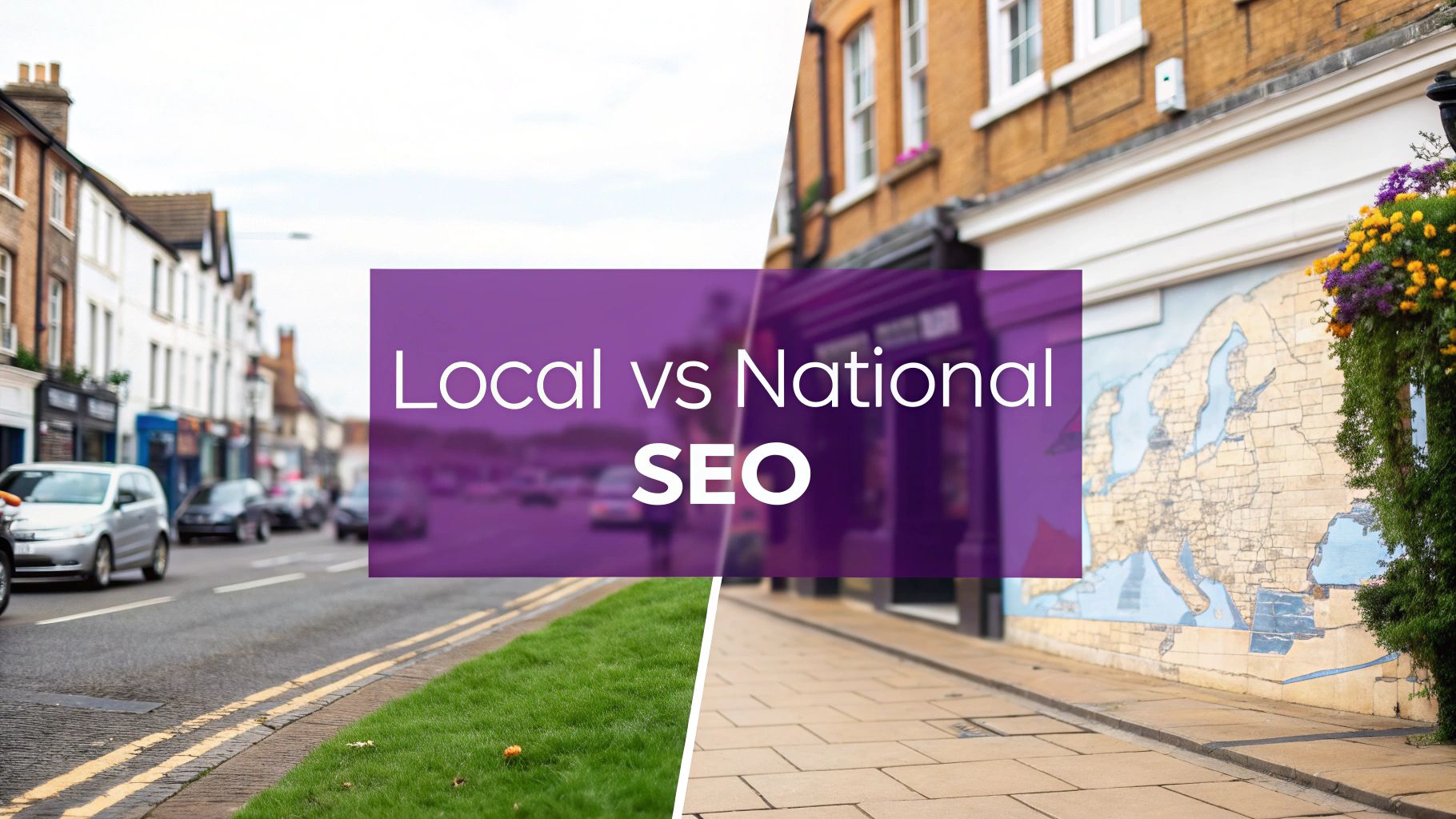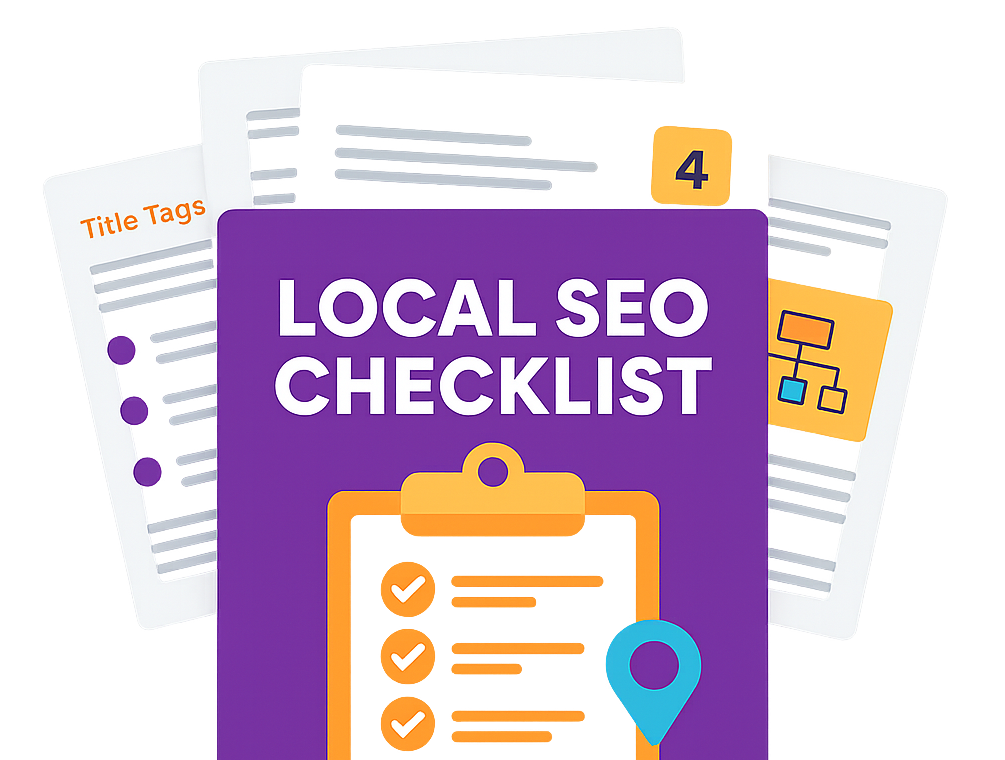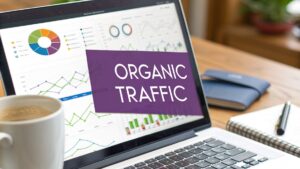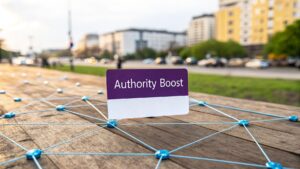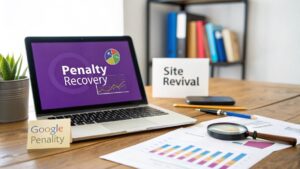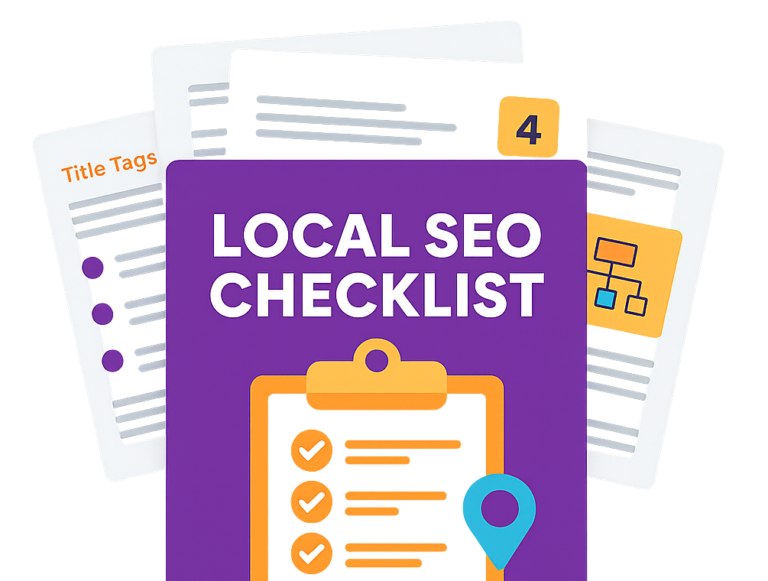At its heart, the difference between local and national SEO boils down to one simple thing: geographical targeting.
Local SEO is all about attracting customers within a specific, defined area—think a city, a county, or even a neighbourhood. It's the perfect fit for any business with a physical address that serves a local community. On the other hand, national SEO aims for a country-wide audience, making it the go-to strategy for e-commerce stores or service providers who aren't tied down by location.
Understanding the Fundamental Differences
Choosing the right SEO path is one of the biggest calls a business can make. It shapes how you find customers, what keywords you chase, and where your marketing budget ultimately goes. Get it wrong, and you're just wasting time and money on opportunities that were never really yours to begin with.
Think about it: a local bakery in Bristol has nothing to gain from ranking nationally for "best cakes". Their entire world revolves around someone searching for "best cakes near me" or "bakery in Bristol". In contrast, an online shop that ships across the UK needs to capture that broader, non-location-specific search traffic to survive.
This distinction is so important because the user's intent is worlds apart. Local searches are often driven by immediate need and a strong desire to buy something right now.
Local vs National SEO At a Glance
To make these differences crystal clear, let's break them down side-by-side. The table below gives a quick snapshot of what defines each approach.
| Attribute | Local SEO | National SEO |
|---|---|---|
| Primary Goal | Drive footfall and local online enquiries. | Increase brand visibility and sales nationwide. |
| Target Audience | Customers within a specific city or region. | A broad, country-wide audience. |
| Keyword Focus | Geo-targeted keywords (e.g., "plumber in Cambridge"). | Broad, non-geographic keywords (e.g., "best running shoes"). |
| Key Tactics | Google Business Profile optimisation, local citations. | High-authority link building, scalable content marketing. |
As you can see, while the overarching goal is always to get noticed, the battlefield and the tactics used are fundamentally different.
The infographic below really brings home some of the performance differences you can expect, especially when it comes to search reach, conversion rates, and mobile search behaviour.
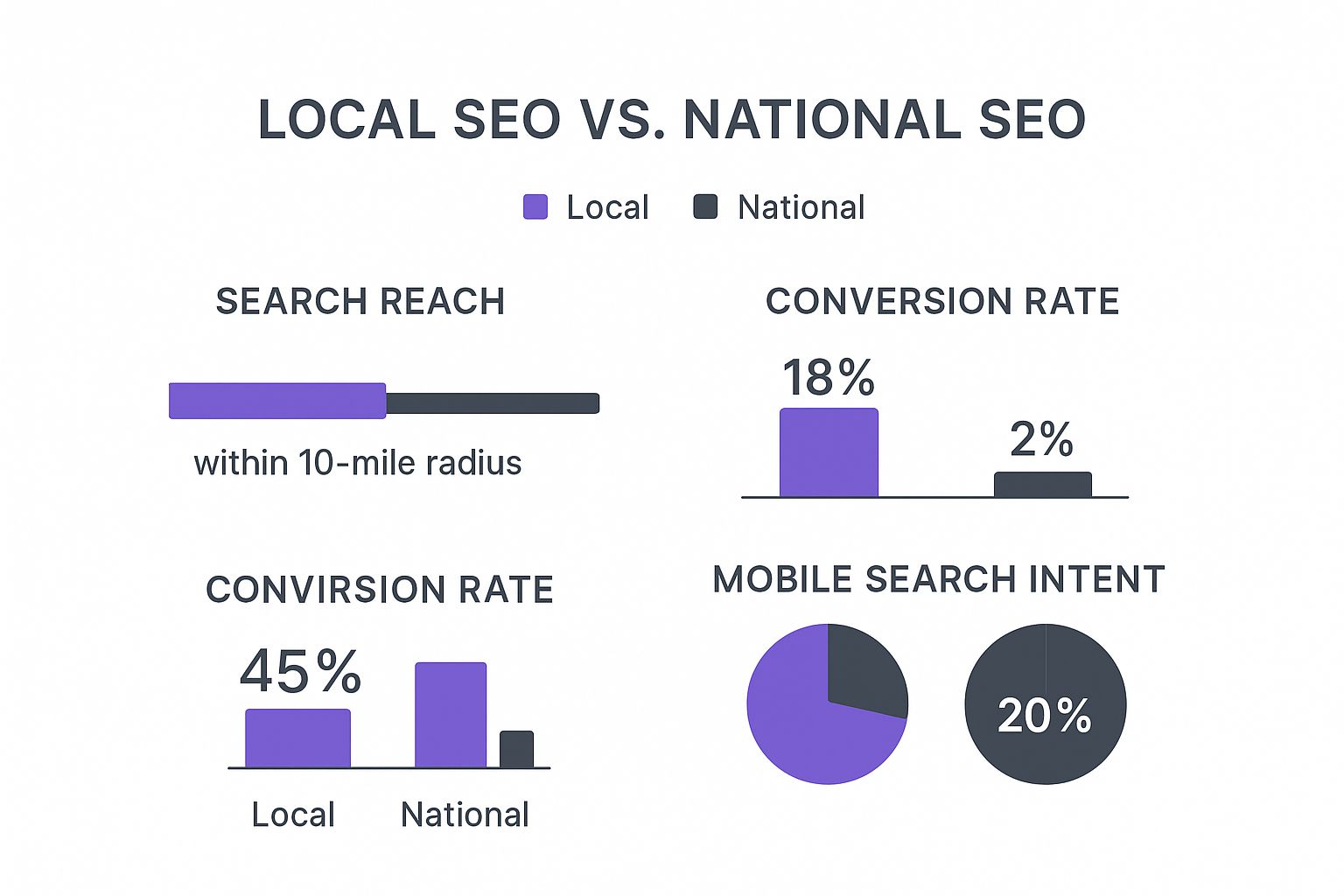
The data makes it obvious: national SEO casts a much wider net, but local SEO is where the high-intent, high-converting customers are often found. Its targeted nature is its greatest strength.
The sheer scale of local search in the UK really puts its importance into perspective. A staggering 46% of all Google searches now have local intent, giving businesses a direct line to a massive, highly motivated audience. What’s more, the incredible 500% growth in ‘near me’ searches over the last five years shows just how much UK consumers now rely on search engines to find solutions right on their doorstep. You can learn more about the latest UK search trends and how they're shaping business strategy today.
Comparing Core SEO Implementation Strategies
When you move from theory to action, the day-to-day work of a local SEO campaign looks completely different from a national one. Both are chasing visibility, of course, but the actual tasks you’ll be doing couldn’t be more distinct. A local campaign is all about digging deep into a specific community, while a national campaign is focused on building broad authority and brand recognition across the UK.
For any business targeting a local audience, the Google Business Profile (GBP) is the absolute heart of the operation. There’s no getting around it. A fully fleshed-out profile—with correct opening hours, services, photos, and a healthy flow of positive reviews—is non-negotiable. It's your ticket to appearing in the all-important 'Map Pack' results.
On the other hand, a national campaign is far less concerned with a single physical address. The focus shifts entirely to building domain authority on a much grander scale. This means earning high-quality backlinks from major publications, industry blogs, and national news outlets to show Google that your website is a trustworthy resource for the entire country.
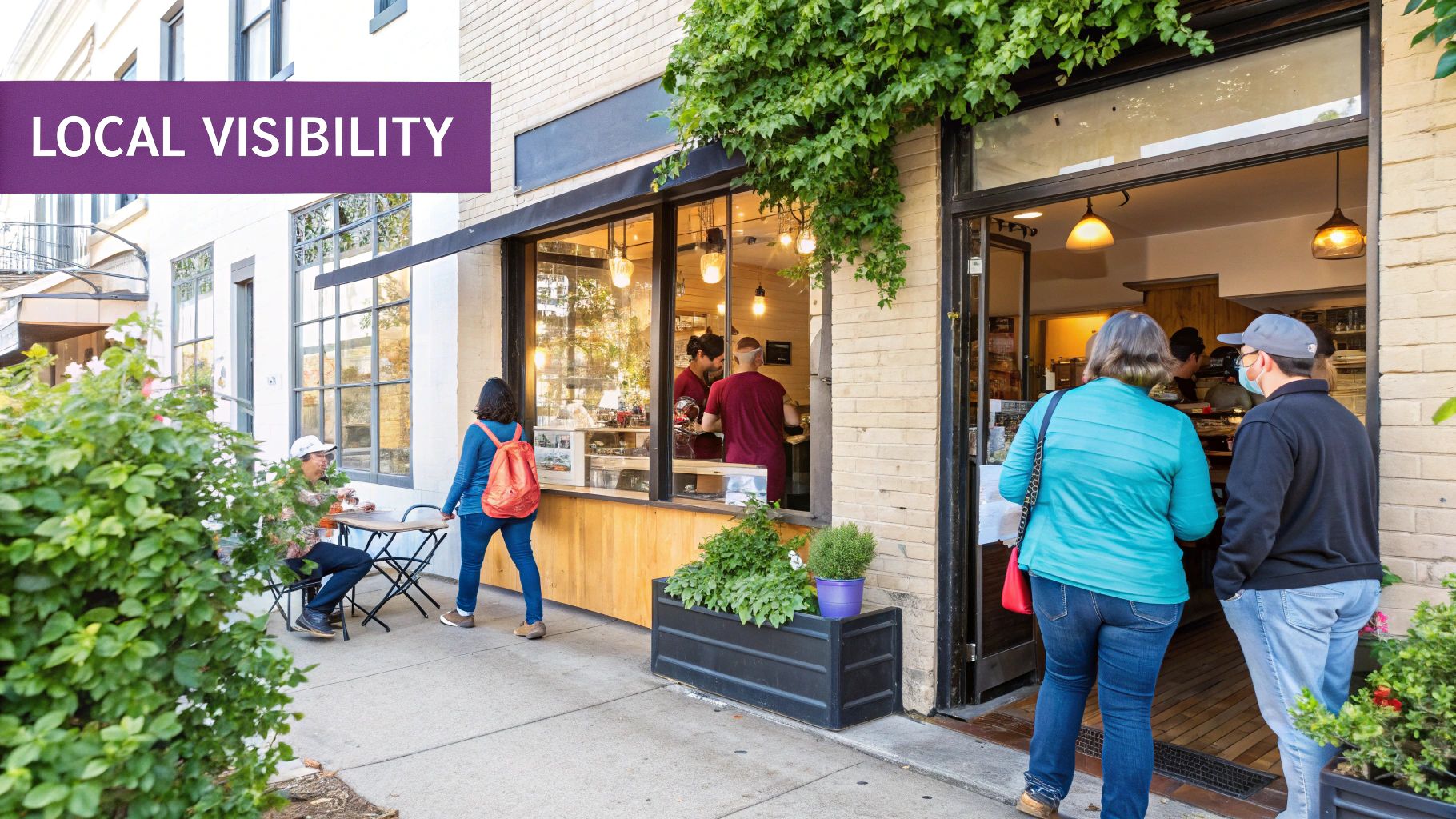
The Role of Content and Keywords
The content you create for each approach is also worlds apart. Local SEO absolutely thrives on geo-targeted content. This means creating web pages and blog posts that name-drop the specific towns, cities, or counties you serve.
A plumber in Manchester, for example, would be smart to create content like:
- "Emergency Boiler Repair in Didsbury"
- "Your Guide to Preventing Frozen Pipes in Greater Manchester"
- "Case Study: A New Bathroom Installation in Chorlton"
This hyper-local approach directly answers what potential customers in the area are searching for, making the content incredibly relevant and effective.
In contrast, national SEO demands a scalable content strategy that speaks to a diverse, country-wide audience. The keywords are broader and have no geographical strings attached. An online furniture retailer would target terms like "buy oak dining tables online" or "best minimalist sofas UK." Their content needs to solve universal problems, not local ones.
The core difference in implementation comes down to this: Local SEO is about proving relevance to a specific place, while national SEO is about establishing authority on a specific topic.
Citations vs High-Authority Backlinks
Link-building is another area where the two strategies diverge sharply. For local businesses, getting your NAP (Name, Address, Phone Number) consistency right across online directories is vital. These listings, known as citations, are like digital signposts that confirm your business's physical location to search engines.
Key places to get local citations include:
- Yell
- Thomson Local
- Local Chamber of Commerce websites
- Industry-specific directories
For a national brand, the game is almost entirely about earning editorially-given backlinks from websites with high domain authority. Just one link from a major news site like The Guardian or a respected industry publication is worth far more than hundreds of directory listings. This kind of link building takes serious resources, often involving digital PR, guest posting on authoritative sites, and creating link-worthy assets like original studies or infographics.
No matter who you're targeting, mastering advanced SEO copywriting tips is fundamental to creating content that actually ranks and brings in traffic. The principles of writing engaging, valuable, and well-optimised text are universal. Ultimately, whether you’re building local citations or chasing national backlinks, the quality of your content is the foundation that holds everything up.
How to Win with a Local SEO Strategy
Winning at local SEO isn't just about showing up online; it's about becoming the undisputed, go-to choice for customers in your immediate area. Unlike a broad national SEO campaign that casts a wide net across the UK, a local strategy is a highly focused effort. You’re targeting people who are physically nearby, often with high intent and ready to make a purchase.
Success here really comes down to mastering three things: proximity, relevance, and local authority.
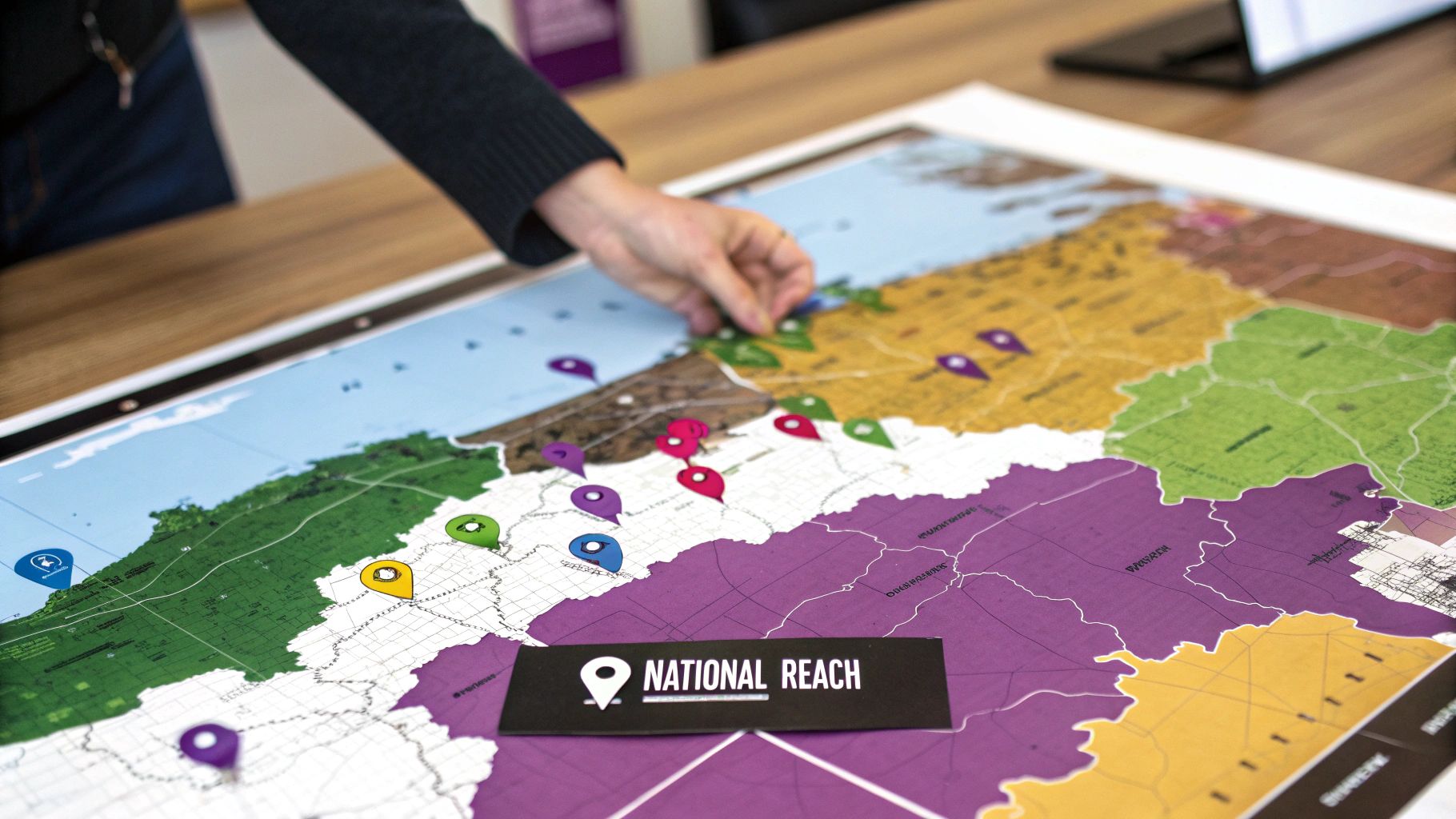
This strategy is all about sending the right signals to search engines to prove you are the best answer for a local query. The prize? A coveted spot in the Google 'Map Pack' or 'Local Pack'. That's the prominent box of three local businesses you see at the top of the results for searches like "cafe near me" or "plumber in Norwich".
Dominating the Local Pack
Your Google Business Profile (GBP) is the absolute cornerstone of your entire local SEO campaign. Think of it as your most powerful tool for climbing the Map Pack rankings. A well-maintained and active profile speaks directly to Google, telling it exactly how relevant you are for local searches.
The data backs this up. In the UK, a huge 19.2% of local search ranking factors are directly tied to how well you’ve optimised your GBP. It's not a minor tweak; businesses that take the time to write keyword-rich descriptions for their profiles can see a 31% boost in their local pack visibility.
And reviews? They're massive. If you can get over 50 reviews with an average rating of 4.5 or higher, your profile has a 57% better chance of ranking in the top local results.
Building Hyper-Local Trust and Authority
Beyond just your GBP, you need to build genuine authority within your local community. This is where link building takes a different turn compared to national campaigns. Forget chasing links from big national publications; your focus should be on getting nods from other local organisations.
Here’s how you can effectively build that local authority:
- Earn Local Links: Get links from your local Chamber of Commerce, community blogs, or local newspapers. Sponsoring a local charity event can also land you a powerful local backlink that acts as a strong endorsement.
- Create Hyper-Local Content: Write content that speaks directly to your community. This could be anything from a neighbourhood guide to a feature on a local event or a case study of a job you did in a specific part of town.
- Leverage Customer Reviews: Don't be shy about asking happy customers to leave reviews on your GBP and other important directories. Social proof is a massive trust signal for both search engines and potential customers.
The core of a winning local strategy is embedding your business into the digital fabric of your community. It’s not just about what you sell, but where you sell it and how connected you are to that place.
Practical Steps for Local Success
To truly own your patch, you need to be consistent and targeted. This means going way beyond a basic profile setup and actively using the tools and tactics available. For a deep dive into what works, it’s worth exploring the 9 best local SEO strategies you can put into practice.
A great place to start is by tracking your performance properly. You need to monitor metrics like your ranking position within specific postcodes, the number of clicks-to-call, and how many people are requesting directions to you from your GBP. Using the best local SEO tools in 2023 will give you the data you need to fine-tune your approach and stay one step ahead of the local competition. This intense focus on local-specific metrics is what really separates local SEO from national SEO, as it ties your digital efforts directly to real-world customer actions.
Scaling Your Reach with National SEO
While local SEO is a game of precision, targeting customers in a specific community, national search engine optimisation (SEO) is a game of scale. It’s all about breaking beyond geographical boundaries to capture a country-wide audience. This is the natural next step for e-commerce stores, national service providers, and any brand aiming to become a household name across the UK.
Moving to this broader stage means your focus has to shift from proximity to authority. Instead of proving you’re the best choice in town, you need to prove you’re a leading voice on a topic nationwide. This involves targeting high-volume, non-geographic keywords designed to pull in a much larger, more diverse crowd.
The heart of a successful national campaign is building serious brand authority. This doesn't happen overnight; it’s the result of a sustained, high-quality content and digital PR strategy built to earn trust from both users and search engines.
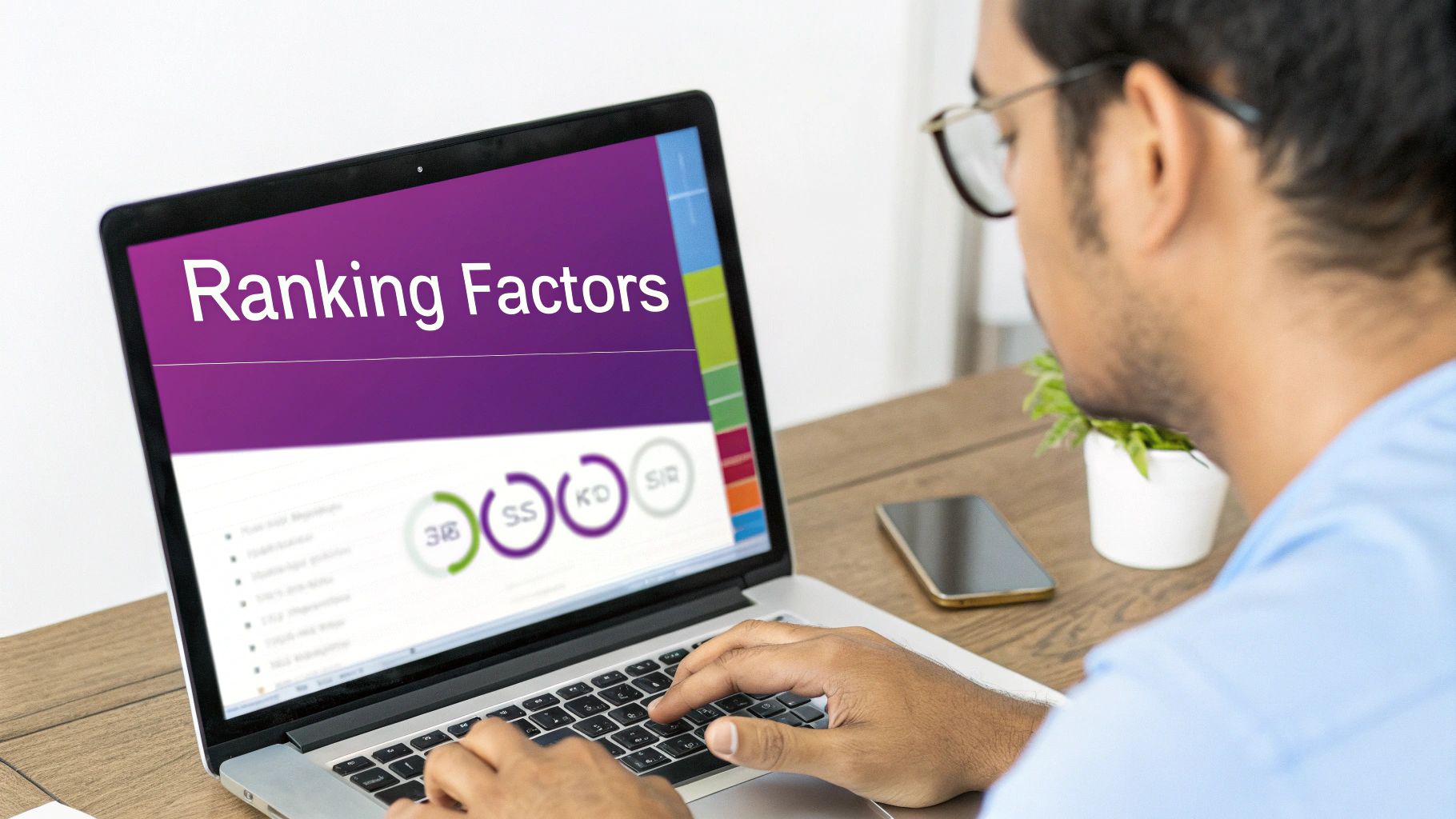
Building Nationwide Brand Authority
At the national level, your website is your brand’s primary asset. A local campaign might lean heavily on a Google Business Profile to do the heavy lifting, but a national strategy lives and dies by the strength of its domain. The goal is to establish your site as the authoritative source of information.
This authority is built through two tightly connected activities:
- Exceptional Content Marketing: You need to create content that answers broad, national-level questions. Think definitive guides, original research, insightful industry analysis, or valuable tools that serve a wide audience. The content has to be absolutely top-tier because you’re competing with the biggest names in your industry.
- High-Authority Backlinks: Earning links from nationally recognised publications, major industry blogs, and respected news outlets is critical. Every one of these backlinks acts as a vote of confidence, signalling to Google that your brand is a credible and important player.
A key difference in the national SEO vs local SEO debate is that national campaigns aren't fussed about local citations. Instead, the focus is squarely on acquiring editorially given links that boost your site’s overall domain authority.
Technical SEO for Large-Scale Websites
As a website grows to serve a national audience, its technical foundations become massively important. A small local business might have a few dozen pages, but a national e-commerce site could have tens of thousands. That kind of scale brings a whole new set of technical challenges.
A robust site architecture is essential. It ensures both users and search engine crawlers can easily navigate and make sense of your content. This involves creating a logical hierarchy, using clear navigation, and implementing an effective internal linking strategy to spread authority across the site.
Schema markup also gets more complex. While a local business uses LocalBusiness schema, a national organisation would use Organisation schema to provide clear, high-level information about the brand itself. This helps search engines understand your entity on a national scale, which is vital for building a brand presence in the search results. And while your GBP profile is less central, some level of Google My Business optimisation for your head office can still support your brand’s overall entity recognition.
For national SEO, your website isn’t just a digital brochure; it’s a national publication. Every technical detail, from site speed to internal linking, must be meticulously managed to support your goal of country-wide visibility.
Ultimately, scaling your reach with national SEO is a long-term investment. It demands a strategic and patient approach focused on building a powerful brand presence, creating outstanding content, and ensuring your website is technically sound enough to compete on the biggest stage.
Measuring SEO Performance and Success
Figuring out if your SEO is actually working isn't a one-size-fits-all job. How you define success depends entirely on whether you're aiming for local customers or a national audience, because the Key Performance Indicators (KPIs) for each are worlds apart. Nailing down the right metrics from the start is the only way to understand your return on investment and make smart decisions.
For local SEO, success is tangible. It’s all about real-world actions. You're measuring how well your online presence drives people through your door or gets your phone ringing. It’s less about chasing huge traffic numbers and more about sparking high-intent interactions within a very specific area.
National SEO, on the other hand, is a much bigger game. The focus shifts to building brand visibility across the UK, establishing authority in your industry, and pulling in a massive volume of organic traffic from a broad, non-location-specific audience.
Key Performance Indicators for Local SEO
When your campaign is laser-focused on your local area, your most valuable insights will come straight from your Google Business Profile (GBP) and local ranking reports. These numbers give you a crystal-clear picture of how people in your community are actually engaging with your business.
Your core local KPIs should include:
- Local Pack Rankings: This is your prime real estate. Tracking your position in the Google 'Map Pack' for your most important local keywords is non-negotiable.
- Google Business Profile Impressions: How many times did your profile pop up in local search results or on Google Maps? This is your baseline for local visibility.
- Clicks-to-Call: This one’s a gem. It shows you exactly how many people clicked the "call" button right from your GBP listing—a clear sign of immediate interest.
- Direction Requests: Are people asking Google for directions to your physical address? This is one of the strongest indicators that your SEO is driving actual footfall.
These are the action-oriented metrics that tell the real story of a successful local campaign. Keeping a close eye on them shows you the direct impact your optimisation efforts are having on customer behaviour.
Key Performance Indicators for National SEO
For a national strategy, you need to zoom out. You're no longer worried about direction requests; you're focused on becoming a go-to resource across the country. The KPIs here reflect those bigger goals of brand reach and digital market share.
Important national KPIs include:
- Overall Organic Traffic: A steady, consistent climb in non-branded organic traffic is a fundamental sign of a healthy national campaign.
- Keyword Rankings for Broad Terms: Success here is about cracking the first page for high-volume, non-geographic keywords that your target audience is searching for.
- Domain Authority (DA): While it's a third-party metric, tracking your DA growth over time is a solid proxy for how well your backlink-building efforts are paying off.
- Conversion Rate: This is the ultimate test. It measures how many of your website visitors are completing a key action, like buying a product or signing up for your newsletter.
These metrics help you gauge your brand's growing influence on a country-wide stage. Understanding the top metrics to measure on-page SEO success gives you a solid foundation for tracking either type of campaign effectively.
The core difference in measurement is simple: local SEO tracks immediate, location-based actions, while national SEO tracks broad, authority-driven growth. Setting the right goals from the start is essential for accurately assessing the effectiveness of your chosen strategy.
Don't underestimate the power of local SEO in the UK. When you combine local and organic searches, they account for a massive 69% of all digital traffic to location-specific websites. Better yet, visitors from local search are highly engaged, holding a 22% session share and delivering a fantastic return through longer page views.
Choosing the Right SEO Strategy for Your Business
Figuring out whether to go for local or national SEO isn't just a small marketing tweak—it's a core decision that shapes who you find online and how quickly your business grows. It’s not about which one is "better" in a vacuum. It's about what fits your business, your customers, and your ambitions.
To make this feel less abstract, let’s walk through a few real-world scenarios. Seeing how different UK businesses should approach SEO will help you connect these ideas to your own company.
Scenario 1: A Bristol-Based Bakery
Imagine a small, independent bakery in Bristol. Their world revolves around the local community. They live and die by the morning coffee run, weekend pastry fans, and custom cake orders from nearby postcodes.
Recommendation: Go all-in on Local SEO.
This is a textbook case for a hyper-local focus. Their goal is to completely own the search results for anyone hungry in their area. Forget ranking nationally; it’s a waste of time and money. Their energy should be poured into perfecting their Google Business Profile with delicious photos, encouraging customer reviews, and targeting keywords like "artisan sourdough Bristol" or "best cupcakes in Clifton". A customer in Edinburgh can't buy their bread, so why try to reach them?
Scenario 2: A National E-commerce Brand
Now think of an online-only shop selling sustainable home goods. They don't have a physical store, and their warehouse can ship to anywhere in the UK, from Cornwall to the Scottish Highlands.
Recommendation: A pure National SEO strategy.
Since their market is the entire country, their SEO needs to match that scale. The game here is building a strong brand that people trust nationwide. This means creating high-quality blog posts and guides targeting broad keywords like "eco-friendly cleaning products" or "bamboo bedding UK." To compete at this level, they need to earn backlinks from major lifestyle blogs and national press to build the kind of website authority that gets them noticed.
The deciding factor is simple: where are your customers? If they need to be physically near you, your strategy must be local. If you can serve them anywhere in the country, your strategy must be national.
Scenario 3: A Multi-Location Plumbing Company
What about a plumbing company with established branches in Manchester, Liverpool, and Leeds? They serve customers across the entire North West but operate out of distinct local hubs.
Recommendation: A Hybrid SEO Approach.
This business needs to think big and small at the same time. On a national level, a polished main website can build overall brand authority. It's the perfect place for content on general DIY plumbing tips or industry news, establishing them as experts.
But the real wins come from the local side. They need dedicated, optimised landing pages for each city (think "emergency plumber Manchester" and "boiler repair Liverpool"). Each branch also needs its own Google Business Profile, managed separately, to ensure they pop up for all those urgent "near me" searches in every service area.
For many small businesses, the biggest hurdle is making any of this happen on a tight budget. Looking into affordable SEO services for small business can give you the expertise you need without breaking the bank. At the end of the day, picking the right strategy just means you're focusing your efforts on finding the right customers, in the right place, at the right time.
Here are the answers to some of the most common questions that crop up when deciding between local and national SEO.
Can a Business Do Both Local and National SEO?
Absolutely. In fact, for certain businesses, a hybrid approach isn't just an option—it's essential. Think of a nationwide retail chain or a restaurant group with locations dotted across the country.
The strategy here is really a two-pronged attack. You use national SEO to build the overarching brand authority and go after those broad, non-geographic search terms. At the same time, you deploy local SEO for each individual storefront, making sure they pop up in 'near me' searches and dominate the Google Map Pack in their specific postcode.
The real trick is making sure both strategies work together. A strong national campaign should feed into and amplify local efforts, ultimately driving more people through the door.
How Long Does it Take to See Results?
This is the big question, and the answer really depends on your focus. Generally, you’ll see tangible results from local SEO much faster. Because you’re only competing within a specific town or city, grabbing a top spot in the local map pack can sometimes happen within just a few months of consistent work.
National SEO, on the other hand, is a marathon, not a sprint.
The competition on a national stage is ferocious. Building the kind of domain authority needed to rank for high-volume, general keywords often takes a good six months to over a year before you see any significant, lasting traction.
Is Local SEO Cheaper Than National SEO?
Typically, yes. A local SEO campaign is naturally more contained. It's focused on a single geographic area and a much tighter list of keywords, which means the resources you need for content, link building, and general management are far more manageable.
A national SEO campaign is a different beast entirely and demands a much larger investment. Competing on a country-wide level requires:
- Extensive, high-quality content creation to cover broad topics.
- A significant budget for digital PR and earning high-authority links.
- In-depth technical SEO to manage what is often a large, complex website.
As a result, the budget required to run a competitive national campaign is usually substantially higher—often costing thousands of pounds more per month than a focused local effort.
Ready to choose the right strategy for your business? The team at Bare Digital offers a free SEO Health Check to analyse your current performance and provide a clear, actionable plan. Discover how our specialist SEO services can boost your rankings and drive real growth by visiting us at https://www.bare-digital.com.

